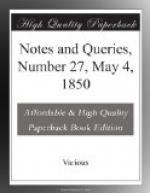C.
* * * * *
NOTES ON BACON AND JEREMY TAYLOR.
In his essay “On Delays,” Bacon quotes a “common verse” to this effect:—“Occasion turneth a bald noddle after she hath presented her locks in front, and no hold taken.” As no reference is given, some readers may be glad to see the original, which occurs in an epigram on [Greek: Kairos] (Brunck’s Analecta, ii. 49.; Posidippi Epigr. 13. in Jacob’s Anthol. ii. 49.).
[Greek:
Hae de komae, ti kat’ opsin; hupantiasanti
labesthai,
nae Dia. Taxopithen d’
eis ti phalakra pelei;
Ton gar apax ptaenoisi parathrexanta me
possin
outis eth’ himeiron
draxetai exopithen.]
In Jermey Taylor’s Life of Christ (Pref. Sec. 29. p. 23. Eden’s edition), it is said that Mela and Solinus report of the Thracians that they believed in the resurrection of the dead. That passage of Mela referred to is, l. ii. c. ii. Sec. 3., where see Tzschucke.
In the same work (Pref. Sec. 20. p. 17.), “AElian tells us of a nation who had a law binding them to beat their parents to death with clubs when they lived to a decrepit age.” See AElian, Var. Hist. iv. 1. p. 330. Gronov., who, however, says nothing of clubs.
In the next sentence, the statement, “the Persian magi mingled with their mothers and all their nearest relatives,” is from Xanthus (Fragm. 28., Didot), apud Clem. Alexandr. (Strom. iii. p. 431 A.). See Jacob’s Lect. Stob. p. 144.; Bahr, On Herodotus, iii. 31.
In the same work (Part I. sect. viii. Sec. 5. note n, p. 174.) is a quotation from Seneca, “O quam contempta res est homo, nisi super humana se erexerit!” which is plainly the original of the lines of Daniel, so often quoted by Coleridge ("Epistle to the Countess of Cumberland"):—
“Unless above himself he can
Erect himself, now mean a thing is man!”
Perhaps some of your readers can supply the reference to the passage in Seneca; which is wanting in Mr. Eden’s edition.
In Part III. sect. xv. Sec. 19. p. 694. note a, of the Life of Christ, is a quotation from Strabo, lib. xv. Add. p. 713., Casaub.
As the two great writers on whom I have made these notes are now in course of publication, any notes which your correspondents can furnish upon them cannot fail to be welcome. Milton also, and Pope, are in the hands of competent editors, who, doubtless, would be glad to have their work rendered more complete through the medium of “NOTES AND QUERIES.”
J.E.B. MAYOR
Marlborough Coll., April 8.
* * * * *
DUKE OF MONMOUTH’S CORRESPONDENCE.




